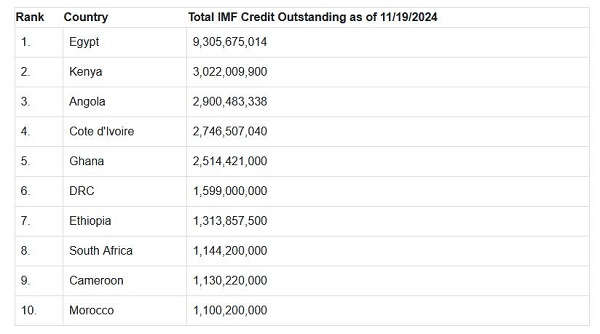IMF Debt Rankings: Ghana listed among Africa's top 10 borrowers
BLOG
12/29/20242 min read


Here’s the updated blog post with the rankings presented as a list instead of a table:
---
IMF Debt Rankings: Ghana Listed Among Africa's Top 10 Borrowers
In recent financial developments, Ghana has found itself among Africa’s top 10 borrowers from the International Monetary Fund (IMF). As of November 19, 2024, the IMF's outstanding credit data highlights the financial standings of African nations with regard to their debt levels. This blog explores the latest IMF credit rankings and their implications.
Top 10 African Nations by IMF Credit Outstanding (as of 11/19/2024)
1. Egypt: $9,305,675,014
2. Kenya: $3,022,009,900
3. Angola: $2,900,483,338
4. Côte d'Ivoire: $2,746,507,040
5. Ghana: $2,514,421,000
6. Democratic Republic of Congo (DRC): $1,599,000,000
7. Ethiopia: $1,313,857,500
8. South Africa: $1,144,200,000
9. Cameroon: $1,130,220,000
10. Morocco: $1,100,200,000
Key Insights from the Rankings
1. Egypt Tops the List
Egypt leads with a staggering $9.3 billion in IMF credit, significantly outpacing other countries on the list. This reflects its reliance on IMF financing to address economic challenges.
2. East Africa’s Presence
Kenya takes the second spot with $3.02 billion, underscoring its efforts to stabilize its economy amidst rising inflation and fiscal deficits.
3. Ghana's Position
Ranked fifth, Ghana owes $2.51 billion to the IMF. This figure highlights the nation’s dependence on international financial support to address debt restructuring and currency stabilization.
4. Diverse Representation Across Africa
The list includes countries from different regions, such as Angola (Central Africa), Morocco (North Africa), and South Africa (Southern Africa), reflecting the widespread economic challenges across the continent.
Implications for Ghana
Ghana’s inclusion in this list comes as no surprise given its recent economic struggles. With inflation soaring and its currency (the Ghanaian cedi) under pressure, the government has sought IMF support to stabilize its economy. However, this growing debt raises concerns about long-term financial sustainability and debt repayment strategies.
Broader Economic Context
The reliance on IMF loans is indicative of broader structural issues affecting African economies. Many countries grapple with trade imbalances, weak currency performance, and political instability, which exacerbate their fiscal challenges. While IMF support provides short-term relief, it also necessitates economic reforms that can be politically sensitive.
Conclusion
Ghana’s position among Africa’s top 10 IMF borrowers highlights the financial pressures facing the nation and its peers. As the global economy continues to shift, these rankings serve as a reminder of the critical need for sustainable economic strategies and effective debt management.
Stay tuned to Bukars.com for more insights on global economic trends and their impact on
Africa.
Bukars | Gubmal Inc © 2024
Bukars, empowers the generation of tomorrow for a brighter future and hope for every individual.
